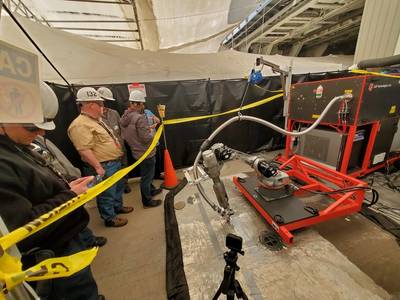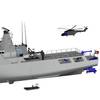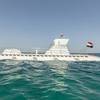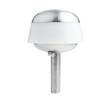Portable Laser Shock Peening System Demonstrated for the US Navy
For the first time, a portable laser shock peening system has been developed for and demonstrated in a shipyard environment and on board a U.S. Navy warship to combat aluminum cracking.
On June 24, 2022, through a 2020 National Shipbuilding Research Program (NSRP) Research Announcement Project, Hepburn and Sons LLC, teamed with LSP Technologies, Vigor Industries and the American Bureau of Shipping (ABS) was able to demonstrate for the first time ever the use of a portable Procudo LSP system both in a shipyard facility and onboard USS Cape St. George (CG-71). This marks a milestone where LSP capability was ruggedized, and its footprint reduced significantly to allow for placement in less-than-optimal conditions in a shipyard and onboard a U.S. Navy vessel using available water, compressed air and electrical power.
This demonstration was the CAPSTONE event of the Hepburn team’s NSRP RA 20-01 project: Onboard Integration of Laser Peening System for Lasting Aluminum Repairs. The event was also the culmination of over seven years of investment by the Navy and industry to prove that LSP is beneficial in treating myriad issues with metals and metal alloys used in the shipbuilding process. Although this NSRP RA 20 project is directly related to addressing the known challenges with the use of 5XXX aluminum alloy in shipbuilding, the team said it has also investigated and proven that LSP is beneficial in other areas such as preventing or significantly delaying major stress and/or corrosion-related cracking.
LSP works by introducing deep, compressive residual stresses into component surfaces, providing enhanced protection against surface-initiated fatigue cracking and failure. LSP mitigates problems such as stress corrosion cracking (SCC), cavitation erosion in water jets, propellers, rudders, hulls, etc., galvanic corrosion at the aluminum and stainless-steel interface in water jets, exfoliation corrosion and sensitization of aluminum alloys.
Hepburn and LSP Technologies efforts to date have identified multiple cost-saving and performance benefits in marine-grade metal alloys with the goal of transitioning LSP capability into public and private shipyards to allow them to conduct their own LSP operations within their facilities and on board ships prior to delivery of new vessels and in maintenance and repair operations of existing ships. LSP can and will provide significant time and cost savings for the Navy, the Naval industrial base, and the entire maritime industry, the companies said.














